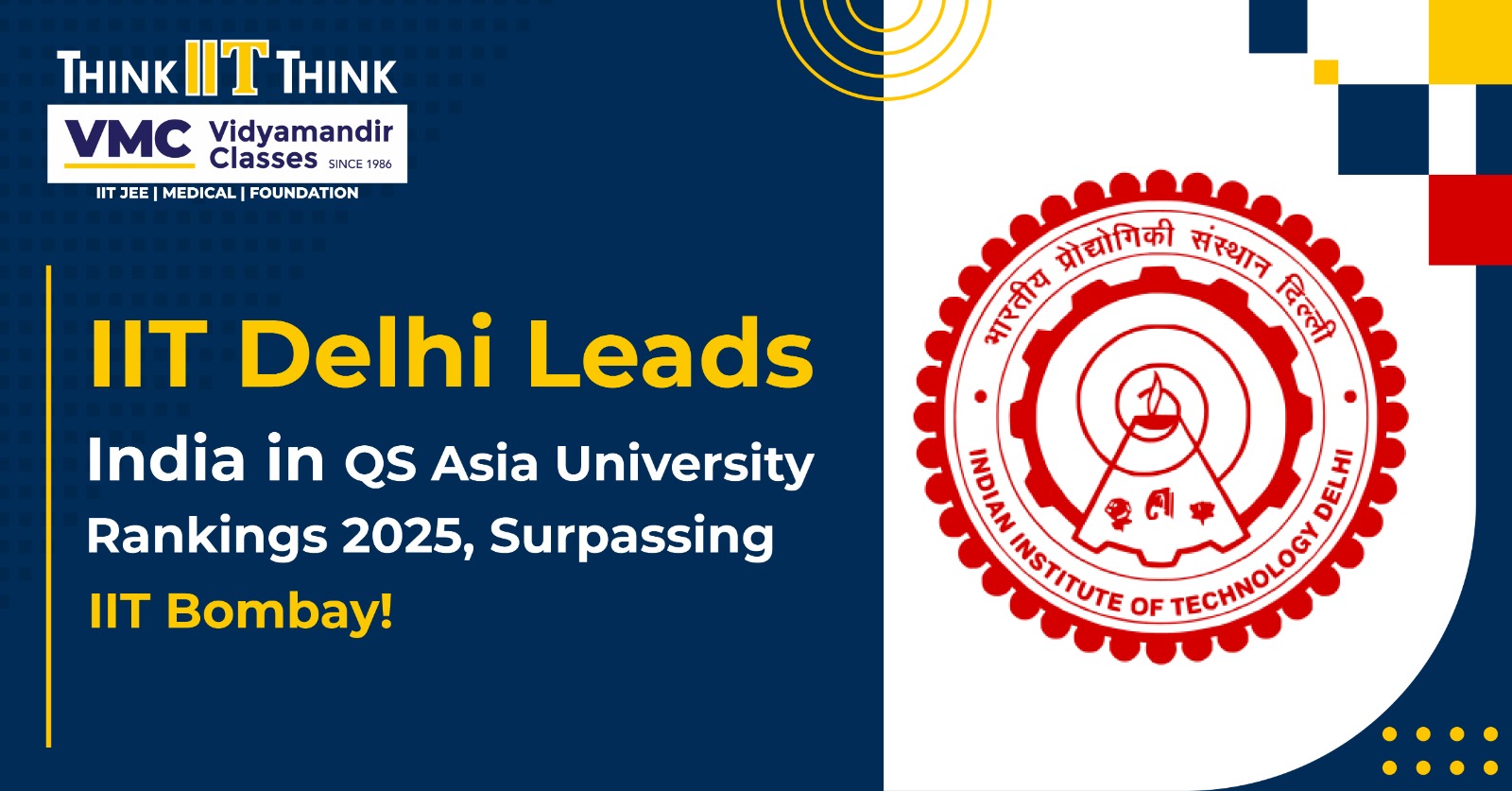IIT Delhi Leads India in QS Asia University Rankings 2025, Surpassing IIT Bombay: A Rising Trend for Indian Universities
 Posted On
Posted On
125 total views, 3 views today
In the latest edition of the QS World University Rankings: Asia 2025, the Indian Institute of Technology Delhi (IIT Delhi) has claimed the prestigious title of India’s leading educational institution. This significant achievement is driven by improvements across multiple indicators, especially in the metric of staff with PhDs, where IIT Delhi made an impressive leap of 58 positions. IIT Delhi’s newfound status not only underscores its commitment to academic excellence but also reflects a broader trend of Indian universities steadily gaining ground in global rankings.
The Rise of IIT Delhi
IIT Delhi’s ascent to the top spot in India has involved surpassing IIT Bombay, which held this position last year. Nationally, IIT Delhi climbed from 46th to 44th in Asia, while IIT Bombay, which was previously ranked 40th, slipped to 48th. This change highlights IIT Delhi’s growing influence and underscores the competitive nature of rankings among Indian institutes. In terms of reputation, IIT Bombay still holds a strong edge, ranking 27th in academic reputation and 16th in employer reputation, reaffirming its longstanding recognition among global academics and industry leaders.
Overall Ranking Trends Among Top Indian Institutes
The performance shift between IIT Delhi and IIT Bombay isn’t an isolated occurrence; other premier institutions in India also saw adjustments in their regional standings. Notably, IIT Madras fell from 53rd to 56th, IIT Kharagpur dropped from 59th to 60th, and IIT Kanpur decreased from 63rd to 67th. Even the renowned Indian Institute of Science (IISc) fell from 58th to 62nd place. While IIT Kharagpur’s dip was relatively minor, these declines signal the highly competitive and dynamic landscape of Asia’s educational rankings.
| Institution | 2025 Rank | 2024 Rank |
| IIT Delhi | 44 | 46 |
| IIT Bombay | 48 | 40 |
| IIT Madras | 56 | 53 |
| IIT Kharagpur | 60 | 59 |
| IISc Bangalore | 62 | 58 |
| IIT Kanpur | 67 | 63 |
Indian Universities Gaining Ground
Interestingly, while some top Indian institutions experienced ranking drops, others showcased notable progress. The University of Delhi (DU) made a significant leap from 94th to 81st, strengthening its standing in the national and regional landscapes. IIT Guwahati ranked 104th, placing it within the top 10 in India. In addition, IIT Roorkee and Jawaharlal Nehru University (JNU) achieved ranks of 108th and 110th, respectively, showcasing the diversity and progress of India’s higher education landscape.
Emerging institutions also made impressive strides, with Chandigarh University climbing to 120th, the University of Petroleum and Energy Studies (UPES) advancing to 148th, and Shoolini University moving up to 168th. UPES notably emerged as Asia’s second most improved university, climbing 70 ranks.
| Institution | 2025 Rank |
| University of Delhi | 81 |
| IIT Guwahati | 104 |
| IIT Roorkee | 108 |
| Jawaharlal Nehru University | 110 |
| Chandigarh University | 120 |
| UPES | 148 |
| Shoolini University | 168 |
India’s Performance in Key Indicators
One of the prominent areas where Indian universities excelled is in the “Papers per Faculty” indicator, which reflects research productivity. In this category, Indian universities secured four out of Asia’s top five spots. Anna University ranked second in Asia in this indicator, highlighting India’s research prowess. Other notable institutions in this category include Maulana Abul Kalam Azad University of Technology, IISc, and Bharathiar University.
| Institution | Indicator Score | Rank in Asia |
| Anna University | 100 | 2 |
| Maulana Abul Kalam Azad University of Technology | 100 | 3 |
| Indian Institute of Science (IISc) | 100 | 4 |
| Bharathiar University | 99.8 | 5 |
The “Staff with PhD” indicator, which emphasizes the academic qualifications of faculty members, also saw impressive performances from India. Institutions like IISc, IIT Madras, IIT Kharagpur, IIT Kanpur, and IIT Ropar, among others, tied for the second position in Asia. This achievement demonstrates India’s dedication to elevating academic standards through a highly qualified faculty.
National Educational Initiatives Driving Change
India’s upward trend in global rankings can be attributed to various educational reforms and initiatives spearheaded by the government. One notable initiative, the National Education Policy (NEP) 2020, emphasizes student-centered reforms and aims to increase the Gross Enrollment Ratio (GER) to 50% by 2035, representing a substantial 40% rise. This policy is designed to make education more accessible and inclusive, thus broadening the pool of talent and ensuring students are better equipped for academic and professional challenges.
The establishment of GIFT City (Gujarat International Finance Tec-City) also supports India’s ambition to become a global education hub. This initiative allows foreign universities to open campuses in India under streamlined regulations, fostering international collaboration. Recently, the University of Southampton announced plans to open a campus in Gurugram, marking a significant step in India’s push to strengthen global academic partnerships and position itself as an attractive destination for international students.
The Growing Reputation of Indian Universities
Reputation has emerged as a vital strength for Indian universities. In the QS rankings, 75% of previously ranked Indian universities improved in academic reputation, while 73% saw gains in employer reputation. These improvements indicate that Indian institutions are increasingly recognized and respected worldwide. Research and faculty productivity continue to be strong points for Indian universities, making them competitive in a global context.
The QS Executive Director for Africa, the Middle East, and South Asia, Dr. Ashwin Fernandes, praised India’s commitment to global education, noting the government’s efforts to expand India’s role as a key player in the academic world. According to Dr. Fernandes, these initiatives underscore India’s intention to strengthen ties with international universities and elevate its educational standards through research collaborations and increased enrollment rates.
Conclusion: India’s Steady Progress Towards Educational Excellence
The QS Asia University Rankings 2025 paints a promising picture for Indian higher education. With IIT Delhi leading the national rankings and Indian universities demonstrating strengths in academic and employer reputation, research productivity, and faculty qualifications, it’s evident that India is making meaningful strides in its education sector.
The government’s sustained efforts to foster global partnerships, invest in research, and drive structural changes within the education system have laid a strong foundation for continued progress. As Indian institutions continue to evolve and climb in rankings, they are poised to become influential players in the global academic arena, contributing not only to the country’s growth but also to the advancement of education worldwide.



